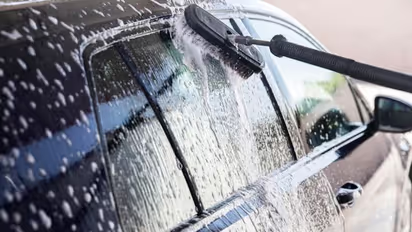7 effective methods to remove hard water spots from your vehicle

Synopsis
Discover effective methods to eliminate hard water spots on vehicles and restore their shine. Explore natural solutions like vinegar and lemon juice, along with detailing sprays and clay bar treatments. Learn how to prevent future water spots and maintain your car's pristine appearance.
Hard water is a common issue faced by car owners, leaving unsightly water spots on the vehicle's surface. These spots are caused by mineral deposits from water that evaporates, leaving behind residue. Over time, if not addressed properly, hard water spots can damage the paintwork and affect the overall appearance of your cherished ride. In this article, we will explore effective methods to remove hard water spots and restore your vehicle's shine.
- Wash Your Car Regularly
Prevention is key to avoiding the buildup of hard water spots. By washing your car regularly, you remove any contaminants before they have a chance to leave mineral deposits. Use a pH-balanced car shampoo, a microfiber wash mitt, and plenty of water to gently clean the surface, ensuring no residue is left behind.
- Use Distilled Water for Final Rinse
To minimize the risk of hard water spots during the final rinse, consider using distilled water or a water filter to remove impurities. Distilled water lacks the minerals that cause water spots, giving you a better chance of avoiding those pesky deposits.
- Quick Detailing Spray
A quick detailing spray can be your best friend in combating hard water spots. Look for a product designed specifically to remove water spots and use it in between regular washes. Spray the affected areas and gently wipe with a microfiber cloth. The detailing spray will help lift the mineral deposits, leaving your car's surface spot-free.
- Vinegar Solution
Vinegar is a natural and effective way to dissolve hard water spots. Create a mixture of equal parts white vinegar and water and apply it to the affected areas with a soft cloth. Let it sit for a few minutes, then gently scrub the spots. Rinse thoroughly with clean water and dry the surface with a microfiber towel.
- Lemon Juice
Lemon juice, with its natural acidic properties, can also help break down mineral deposits. Squeeze fresh lemon juice onto a cloth and apply it to the hard water spots. Allow the juice to sit for a few minutes before scrubbing gently. Rinse off with water and dry the surface.
- Clay Bar Treatment
For more stubborn hard water spots, a clay bar treatment can work wonders. Purchase a clay bar kit from an automotive store and follow the instructions provided. The clay bar will help remove embedded contaminants, including mineral deposits, from the car's surface. Remember to lubricate the area with a detailing spray while using the clay bar to prevent scratching.
Also Read | Charging an electric battery in Karnataka just got 18% costlier
- Polishing and Waxing
Once you've successfully removed the hard water spots, consider polishing and waxing your car to protect the paint and create a barrier against future water spots. Polishing helps restore the shine and smoothness of the paint, while waxing provides a protective layer that repels water and contaminants.
Hard water spots can be a nuisance for car owners, but with the right approach and maintenance, they can be easily removed and prevented. Regular washing, using distilled water for the final rinse, and utilizing detailing sprays are all effective ways to keep your car's surface free from unsightly mineral deposits. Should you encounter stubborn spots, natural solutions like vinegar and lemon juice, as well as clay bar treatments, can come to your rescue. Remember to finish off with polishing and waxing to ensure your vehicle remains sparkling and protected from future hard water spots. By following these tips, you'll keep your beloved ride looking its best for years to come.
Get all the latest Automobile News, including updates on Electric Vehicles, new car and bike launches, reviews, and auto industry trends. Stay informed about mileage comparisons, performance insights, and expert opinions to guide your next vehicle choice. Download the Asianet News Official App for all the latest updates from the world of automobiles.